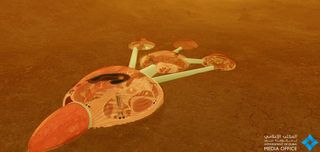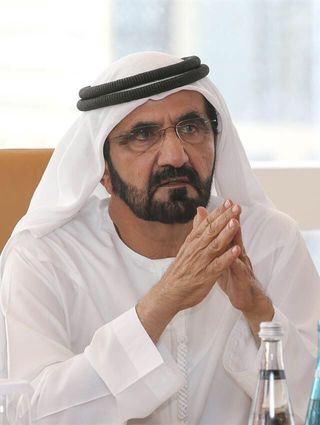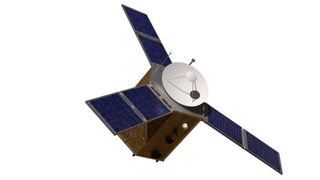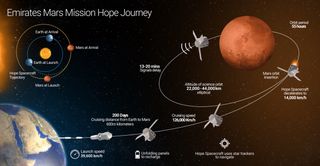
United Arab Emirates Wants to Build a City on Mars

The United Arab Emirates has Mars in its sights, not only moving forward on a Mars orbiter but also establishing the first human settlement on the Red Planet by 2117.

UAE Vice President Sheikh Mohammed bin Rashid Al Maktoum, Prime Minister and Ruler of Dubai, unveiled the "Mars 2117 Project" on Feb. 14 during the 5th World Government Summit in Dubai. The announced the project with Crown Prince Sheikh Mohamed bin Zayed Al Nahyan, Deputy Supreme Commander of the UAE Armed Forces.
"The landing of people on other planets has been a longtime dream for humans. Our aim is that the UAE will spearhead international efforts to make this dream a reality," Al Maktoum said in a statement.
First phase
According to the Government of Dubai Media Office website, the first phase of the project will focus on developing the skills and technologies to achieve scientific breakthroughs needed to send humans to Mars in the next decades.
The Mars 2117 Project also aims to prepare an Emiratis scientists team and to develop an international scientific consortium to speed up the research project, the website explains. "The project will start with an Emiratis scientific team and will be extended to include international scientists and researchers, in addition to streamline the human efforts in term of exploring and settlement of the Red Planet."
The initiative also focuses on developing faster means of transportation to and from the Red Planet, along with integrating the scientific visualization the settlement itself, and how life will be sustained there in terms of such items as food, transportation and energy supplies.
Earlier, the website adds, an Emirati team of engineers, along with a group of scientists and researchers, have sketched out the first human city on Mars, one that would be built by robots. The plan showcased during the recently held summit highlighted the expected lifestyle on Mars in terms of transport, power production and providing food, as well as materials used for the construction of the city.
Get the Space.com Newsletter
Breaking space news, the latest updates on rocket launches, skywatching events and more!
Hope orbiter
Meanwhile, UAE engineers are at work on building the "Hope" Mars orbiter. It is the UAE's first spacecraft to the Red Planet and will be launched in 2020 using Japan's H-2A booster.
Hope is scheduled to arrive at Mars in 2021 to coincide with the 50th anniversary of the founding of the UAE. The orbiter's science task is to search for connections between current weather on Mars and the planet's ancient climate.

Orbital science operations of the craft are to start mid-2021. The mission expected to last two years, with a potential extended mission of two further years.
The Hope mission to Mars is on track and on time, Mohammed Al Ahbabi, director general of UAE Space Agency, said at the recent two-day Global Space Congress in Abu Dhabi, capital of the UAE.

Leonard David is author of "Mars: Our Future on the Red Planet," published by National Geographic. The book is a companion to the National Geographic Channel series "Mars." A longtime writer for Space.com, David has been reporting on the space industry for more than five decades. Follow us @Spacedotcom, Facebook or Google+. Originally published on Space.com.
Join our Space Forums to keep talking space on the latest missions, night sky and more! And if you have a news tip, correction or comment, let us know at: community@space.com.

Leonard David is an award-winning space journalist who has been reporting on space activities for more than 50 years. Currently writing as Space.com's Space Insider Columnist among his other projects, Leonard has authored numerous books on space exploration, Mars missions and more, with his latest being "Moon Rush: The New Space Race" published in 2019 by National Geographic. He also wrote "Mars: Our Future on the Red Planet" released in 2016 by National Geographic. Leonard has served as a correspondent for SpaceNews, Scientific American and Aerospace America for the AIAA. He was received many awards, including the first Ordway Award for Sustained Excellence in Spaceflight History in 2015 at the AAS Wernher von Braun Memorial Symposium. You can find out Leonard's latest project at his website and on Twitter.
